Oil Coming Out of Your Exhaust? (Here’s What it Means)
Oil dripping from the tailpipe is an alarming sight. Where did it come from and what damage does it signify? This strange occurrence likely points to internal engine issues needing diagnosis.
Learn what causes oil coming out of your exhaust, how to pinpoint the problem’s origin, and whether it’s even safe to continue driving since we know that oil can catch on fire.
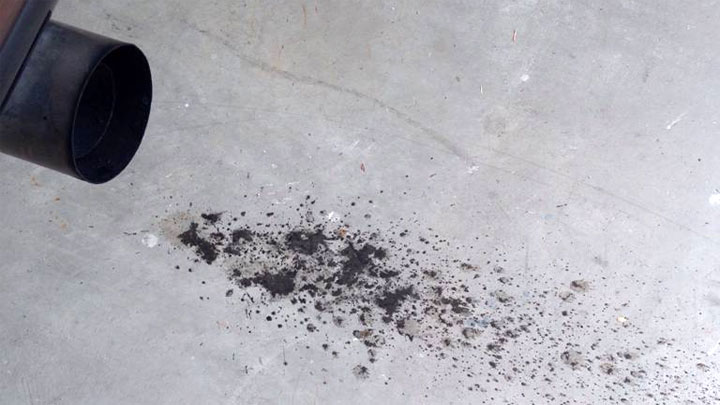
What It Means When Oil Is Coming Out of an Exhaust
The only way that oil can find its way out of your vehicle’s tailpipe, is to enter the engine’s exhaust stream, at one particular point or another. However, this can occur in a number of different ways.
Understanding such possibilities assists you in diagnosing and remedying such issues when encountered.
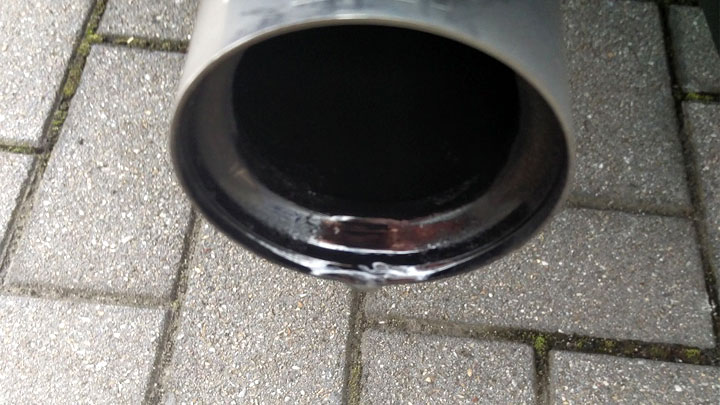
Simply put, oil is introduced into the exhaust stream via the exhaust ports of one or more of an engine’s cylinders. This oil is then displaced into an engine’s exhaust manifold, through the natural downstream flow of exhaust gases.
Oil is then routed rearward through an engine’s exhaust, catalytic converter(s), and muffler(s).
Upon reaching the end of a vehicle’s exhaust stream, this oil looks like black liquid dripping from the exhaust. This, however, is not to be confused with the sight of condensation or water dripping from a black-soot covered tailpipe.
Common Causes of Oil Coming Out of an Exhaust
Oil can enter a vehicle’s exhaust system in several different manners. While some of these failures are more common than others, it certainly pays to understand the complexities of each.
The following are several of the most common causes of oil coming out of your vehicle’s exhaust.
#1 – Clogged PCV Valve
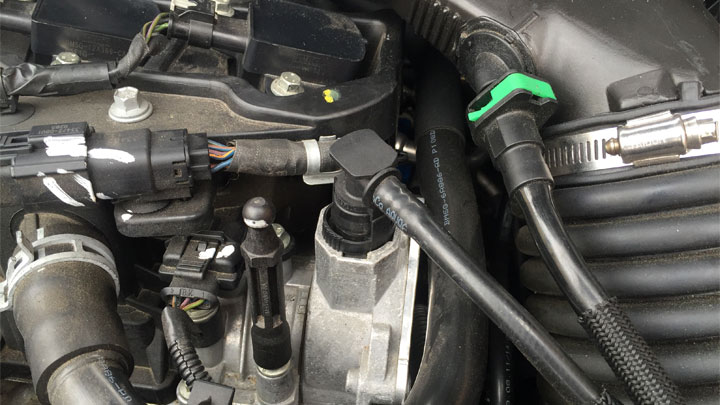
An engine’s positive crankcase ventilation valve is responsible for rerouting a certain volume of combustion gases into each cylinder for further combustion.
However, a clog in this valve can lead to the over-pressurization of an engine’s crankcase, thereby leading to the bypass of seals. As a result, oil can be deposited into an engine’s exhaust tract.
This can also cause oil to appear in your intake manifold, throttle body, or intake piping.
#2 – Blown Head Gasket
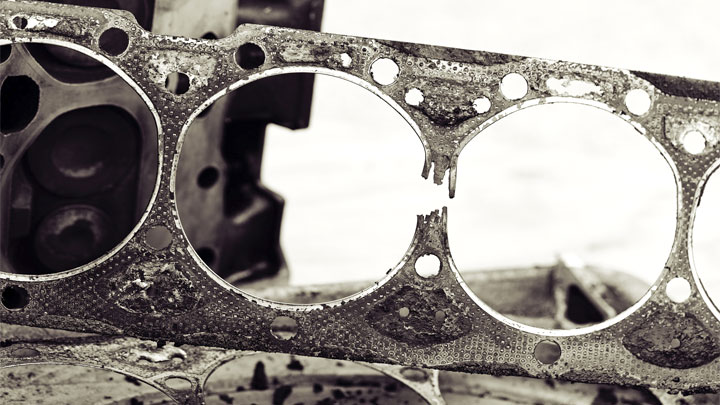
A blown head gasket can also be responsible for the inadvertent delivery of oil into the engine’s exhaust stream. In proper functioning order, an engine’s head gasket separates each of a vehicle’s fluids from one another.
The head gasket also prevents fluid loss into an engine’s combustion chambers. However, a failed head gasket can allow oil to make its way directly into one or more cylinders.
#3 – Worn Valve Guides
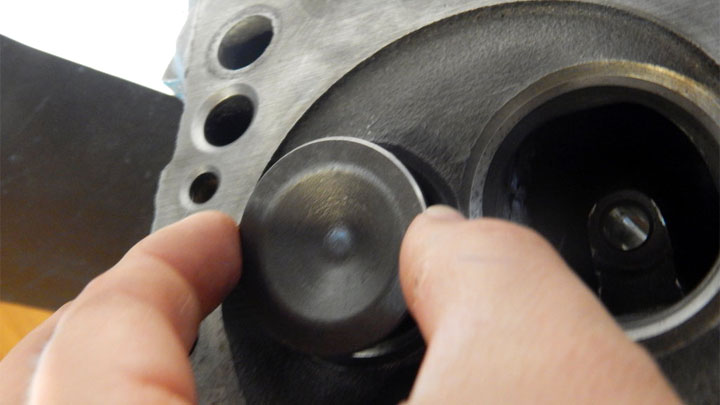
An engine’s valve guides prevent lubricating oil from passing beyond a cylinder head’s valve stems. But like any component, an engine’s valve guides are susceptible to wear over the course of time.
This presents an opportunity for oil to seep by into an engine’s exhaust, often presenting a bluish-grey smoke as a byproduct. In severe cases, oil can be seen passing from an engine’s exhaust.
#4 – Broken Piston Rings
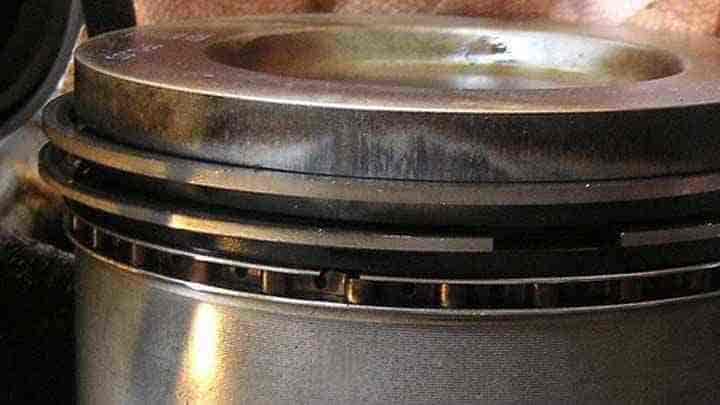
Each of an engine’s cylinders features piston rings, which move up and down with the movement of the cylinder’s piston itself. These rings serve a vital function, by preventing excess combustion loss.
However, these piston rings also prevent oil from making its way into the combustion chamber. When one or more of a piston’s rings become broken, oil loss into an engine’s exhaust tends to be rapid.
#5 – Cracked Block or Head
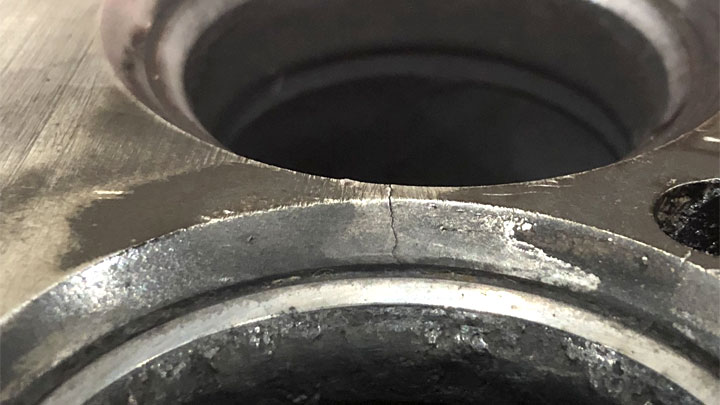
Structurally, an engine consists of a block and one or more cylinder heads. These main structural components must remain in peak condition, in order for engine performance to be maximized.
However, cracks within cylinder heads or an engine block do occur on occasion, often resulting in the loss of engine oil into combustion spaces. When this occurs, oil is carried downstream, until eventually exiting a vehicle’s tailpipe.
#6 – Damaged Piston
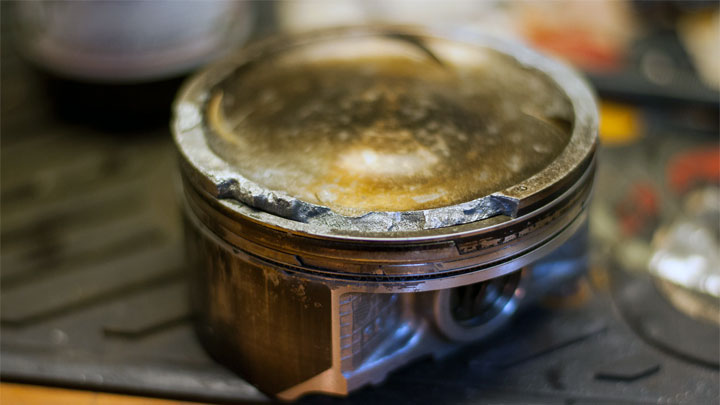
In certain rare cases, the head of one or more of an engine’s pistons can become damaged, allowing for the displacement of oil into an engine’s combustion chambers.
A certain amount of this oil is then burnt, while all remaining oil is expelled downstream into an engine’s exhaust manifold, via open exhaust valves. If severe enough, a portion of this oil will be pushed out of a vehicle’s exhaust pipe.
Is It Safe to Continue Driving?
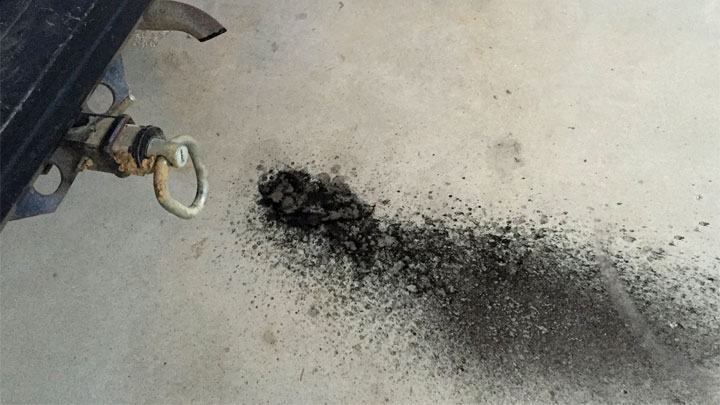
Under most circumstances, a vehicle should be driven to the nearest service center and removed from service upon the first signs of oil leaking from its exhaust. This is due to the fact that such issues are often indicative of much larger problems, including instances of internal engine damage.
Therefore, the continued operation of a vehicle in this state can actually result in further damage. This, in turn, could necessitate the more extensive expenditure of both time and effort in order to take corrective action.
Extensive loss of engine oil into a vehicle’s exhaust also risks potential fire.
Can Oil On an Exhaust Catch Fire?
Oil can indeed catch fire on a vehicle’s hot exhaust. This tends to be most prevalent when this oil collects on or around an engine’s exhaust manifold, where existing exhaust tends to be the hottest.
But in most cases, the oil will solder or smoke, before actually creating an open flame. Smoke that is produced will typically be bluish-grey in color.
Additionally, the superheated engine oil will generally create an easily identifiable burning odor. This odor tends to be evident even to those seated within a vehicle’s cabin, especially if such fumes are scavenged through a vehicle’s fresh-air ducts.
- P0480 Code (Symptoms, Causes, and How to Fix) - Apr 19, 2024
- Car Temperature Gauge Stopped Working? (Here’s Why) - Apr 15, 2024
- Ignition Coil vs Coil Pack (What’s the Difference?) - Apr 8, 2024

I have just bought a 73 Mustang. All valve stem seals have been replaced. It blows no smoke when you put your foor down put some black oil comes out when starting after a few days rest.
I have brand new pickup truck, i started it when it’s was rest for few days and i noticed that there’re an oil copming from exhaust pipe, i see the Common Causes of Oil Coming Out but my pickup it’s just 1000 miles on speedometer what should i do !
What kind of truck is it? If it only has 1000 miles I’d take it back to the dealership to have them look at it. It should be under warranty.
What is a leak down test?
A leak down test is where you hook up compressed air to each combustion chamber (after removing the spark plug). Once the cylinder has some air pressure in it, you can tell the amount of leakage in each cylinder and compare them across the engine. No engine seals perfectly so there will be some air leakage, but the leakage should be small and consistent across all cylinders.
You can determine a lot of problems with this test based on where the leaking air is coming from. For instance, if you hear air hissing out of the exhaust, the exhaust valve(s) are not closing completely, leaving a small space for air to escape.
I too have 50 year old Stag. There is oil coming from exhausts. I have done a compression test and all cylinders got to around 125 psi. I noticed one spark plug hole has a slightly damaged thread and that spark plug had some oil on it when removed. All spark plugs were sooty.
125 seems a little on the low side but I am not familiar with this car, and it is 50 years old. Is this considered within the range of normal for a Stag? It may be OK.
Is the vehicle running rough or giving you issues other than the oil in the exhaust? How much oil are we talking about? You could try doing a leak down test to see if that helps determine where the oil is coming from.
I have a golf r it is smoking and oil is coming from the exhaust. I have changed valves stem seals, valves and valve guides not sure if is smoking because of the oil that still in exhaust please help.
I would do a leak down test next to see where that oil is coming from. It’s possible the answer is that simple, but if you’re losing oil at all my guess is there is still a leak somewhere.
How the oil is coming out of the engine exhaust pipe ?
That could happen if oil is leaking from the valve stem seals or if you had worn piston rings.
I have an Audi Q5 2.0L which is known to have piston/ piston ring problems. I am now burning a quart of oil every 150 miles with oil coming out of the exhaust. Should I start with replacing just the rings or should I replace the pistons as well at the same time? Is there a big price difference to do just rings vs.both?
A lot of the work will be labor charges to tear down the engine to the short block. At that point, I would rebuild or replace anything that the shop deems necessary. Shouldn’t be a big price difference once they’re in there.
So it be pretty safe to say you will lose oil pressure with any of these issues …correct
Actually you probably wouldn’t lose oil pressure with any of them. Worn seals and gaskets don’t affect the operation of the oil pump unless you run really low on oil. Theoretically you would maintain oil pressure with a messed up piston provided the engine could still turn over freely. Either it runs with those issues and you have oil pressure or the engine seizes. Oil pumps are driven off of the crankshaft.
Hi, I did a oil change in a store. It starts dripping oil from the exhaust pipe. What should I do with it? Too much oil?
Can you tell where the drip is coming from? Clean the oil off the exhaust and find the source of the drip is what I would do.
Notice a drip under my rear. Then seen my muffler look wet/oily! Just had carb work done! Yet the drips came 2 days later! Any thoughts
Can you tell what the fluid is? Is it just water, or could it be oil or gas?
Gas would be really bad and should be fixed immediately. Oil may be a small leak somewhere, and should be fixed but isn’t as urgent. Water is probably no big deal.
If the oil level in engine sump is much more than the recommended.Will that cause oil to come out of the exhaust pipe?
I suppose it might be possible if you way overfilled the oil. If you’re only a quart or so overfilled, that shouldn’t happen. Overfilling the oil could cause other problems too, though.
If you see oil in the exhaust, I would do a compression or leak down test to see if you can figure out if any of the seals around the combustion chamber have gone bad.
My car spits oil through its exhaust . Its Honda Ballade SO 4. 1994 MODEL
It may have a leak in the exhaust valve seals. You may be able to confirm this by doing a leak down test. If you hear a bunch of air rushing out of the exhaust during the test, you know the leak is coming from the exhaust valves.
Thank you for a good lessons
I have noticed on start up on a cold morning a mixture of water vapour and soot from the exhaust it’s a 50yr old stag,it’s not burning oil ,I’m not losing water,just had motd and the emissions are **** on,the carbs tuned,it drives faultless no smoking issues,is there anything to be concerned about
A little water vapor from the exhaust on a cold morning first start is pretty normal. The soot could just be due to age. I wouldn’t worry about it unless you start having other issues.